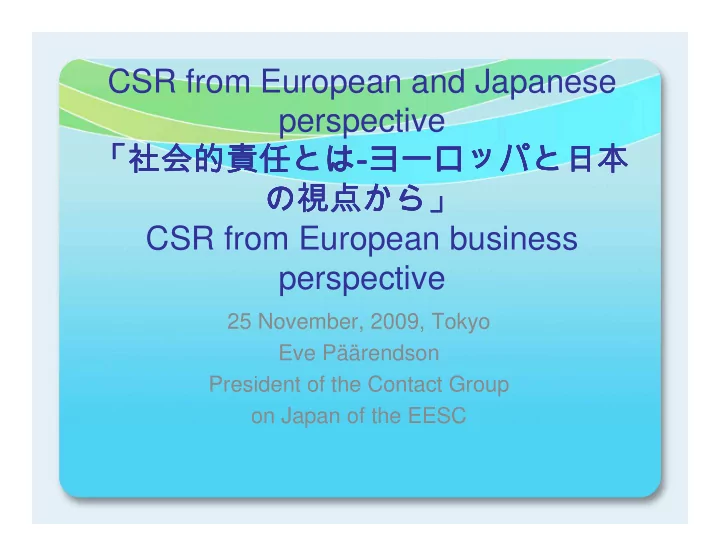

CSR from European and Japanese perspective 「社会的責任とは 「社会的責任とは 「社会的責任とは 「社会的責任とは‐ ‐ ‐ ‐ヨーロッパと日本 ヨーロッパと日本 ヨーロッパと日本 ヨーロッパと日本 の視点から」 の視点から」 の視点から」 の視点から」 CSR from European business perspective 25 November, 2009, Tokyo Eve Päärendson President of the Contact Group on Japan of the EESC
Content • EESC & its cooperation with Japanese counterparts • CSR from European business perspective
Institutional position of the EESC: Established by Treaty of Rome in 1957, 344 members from the 27 member states European Commission
EESC & Japan : February 2007, Opinion on “EU-Japan relations: the • role of civil society” , February, 2009 permanent contact group on Japan • • Joint workshops: – Participatory process towards sustainable society & economy, (Kobe) – Environmental protection, (Kobe) – Education & sustainable development, (Kobe) – Future of employment in Europe & Japan (Brussels) • exchange of speakers, • internship opportunities for Japanese students at the EESC
What is CSR? • “A concept whereby companies integrate social and environmental concerns in their business and in their interactions with their stakeholders on a voluntary basis” (European Commission) • CSR is part of the EU Growth and Jobs Strategy ( the Lisbon Strategy )
What is CSR? • CSR is the voluntary activity undertaken by business over and above legal requirements in economic , social and environmental considerations • CSR is flexible and diverse : it does not fit into one- size frameworks • CSR involves consulting all stakeholders where relevant • CSR is about globalisation: building competitiveness and sustainability
CSR – 4 justifications for companies • Moral obligation : different cultures/different values – are these being met by the company locally? • Sustainability : chemicals/mining where there is a real environmental threat against issues like packaging, where misuse of raw materials and poor disposal are key • Company reputation : imago, brand recognition, share – insurance • Licence to operate : overt or tacit support
CSR : source of opportunity, innovation, & competitive advantage
What is CSR? • CSR needs to develop a stronger international dimension, whilst respecting cultural differences • Ethical trading standards and a philosophy of continuous improvement should play an increasingly important role in CSR related activities • How far are European standards seen as helpful – or as interference? • Companies can work together with public authorities but cannot act in substitution for them or their responsibilities • International companies must operate on a level playing field with local companies around the world
Businesses for transparency: • Transparency and CSR methods for rebuilding the trust in businesses that has been damaged by the crisis • EC´s initiative on Transparency & disclosure of environmental, social and governance (ESG) information (seminars, workshops in autumn/spring 2009-10) • This should not be confused with introducing CSR regulation as a preventive measure to generate more responsible companies
Initiatives on CSR: • In March 2006 the EC adopted a communication on CSR • In March 2006 Communication, the EC launced the “ European Alliance for CSR ” together with European business leaders • 20 laboratories were established
40 central industrial & employers´ federations from 34 countries: 20 million SMEs, & large companies • Businesseurope-voice of European businesses, • Businesseurope - member of the the European Alliance on CSR • Companies strengthen pro-active cooperation with policy-makers and other stakeholders at national and international level to create a strong, competitive Europe based on sustainable development and progress
CSR activities at national level: • Debates on CSR • Awareness raising activities for improving knowledge of CSR among Europe´s companies: • Setting up websites • Publishing brochures • Developing practical tools to facilitate and support companies with their CSR activities • Training programmes on CSR have been launched jointly with schools and universities to enhance knowledge about sustainability • Seminars with bringing together all stakeholders • Assistance for developing national voluntary agreements
Strategy & activities on CSR: • A memorandum on CSR : despite the economic downturn, European companies are commited to, and continue their CSR activities, CSR has become integral part of their business operations • a statement on transparency
Current developments at EU level: • The European Commission´s (EC) initiatives: On CSR Disclosure and Transparency (disclosure • information on Social, Environmental and Governance ( ESG transparency ): a series of workshops organised by the EC with stakeholders and field experts • Prospects for 2010 onwards: promoting the EUs socially responsible competitiveness model The European Parliament (EP): establishment of a • new Parliamentary Intergroup on CSR ( December 2009): the role of business and its contribution to sustainability in the society of the 21 st Century
European companies message to policy-makers: • Reforms to create framework conditions for European businesses that allow them to develop a responsible and sustainable growth path and to successfully compete in a global economy. • Strengthening European business competitiveness by viewing CSR in an international rather than purely European context. • Stock-taking exercise every 2 years of what is practised by all stakeholders on CSR, in order to develop good practices, & update & raise the general knowledge on different paths to CSR in the EU member states.
SUMMARY: •Core values of the European way of doing business: equal opportunities , fair working conditions , exclusion of child labour , combating corruption , promote social inclusion & healthy environment • CSR is an integral part of modern business • CSR is a value-based tool for anticipating to integral & external economic, social or environemntal challenges
SUMMARY : Important to avoid: • one-size fits all policy approaches to CSR, • standardised, transparency indicators or regulation on CSR
THANK YOU FOR YOUR ATTENTION DOOMO ARIGATO GOZAIMASU EESC – European Economic and Social Committee Eve Päärendson E-mail: eve@employers.ee Tel: +3725054570 Web: www.eesc.europa.eu
Recommend
More recommend